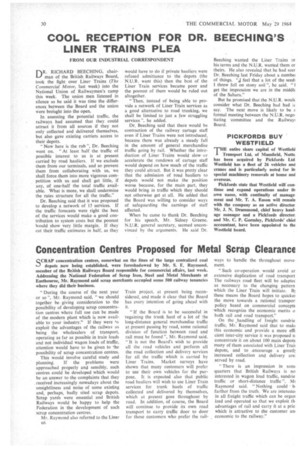Concentration Centres Proposed for Metal Scrap Clearance
Page 32

If you've noticed an error in this article please click here to report it so we can fix it.
QCRAP concentration centres, somewhat on the lines of the large centralized coal
■ -) depots now being established, were foreshadowed by Mr. S. E. Raymond, member of the British Railways Board responsible for commercial affairs, last week. Addressing the National Federation _of Scrap Iron, Steel and Metal Merchants at Eastbourne, Mr. Raymond said scrap merchants occupied some 500 railway tenancies where they did their business.
" During the course of the next year or so ", Mr. Raymond said, "we should together be giving consideration to the possibility of developing scrap concentration centres where full use can be made of the modern plant which is now available to your industry." If they were ro exploit the advantages of the railway as being the wholesalers of transport, operating as far as possible in train loads and not individual wagon toads of traffic, attention would have to be given to he possibility of scrap concentration centres.
This would involve careful study and planning. If the problems were approached properly and sensibly, such centres could be developed which would be an answer to the complaints that they . received increasingly nowadays about the unsightliness and noise of some existing and, perhaps, badly sited scrap depots. Scrap yards were essential and British Railways would be happy to help the Federation in the development of such scrap concentration centres.
Mr. Raymond also referred to the Liner B6 Train project, at present being reconsidered, and made it clear that the Board has every intention of going ahead with it.
"If the Board is to be successful in regaining the trunk haul of a lot of the long-distance general merchandise traffic at present passing by road, some rational division of function between road and rail must be found ", Mr. Raymond said. " It is not the Board's wish to provide all the road vehicles and perform all the road collection and delivery services for all the traffic which is carried by Liner Trains. Market surveys have shown that many customers will prefer to use their own vehicles for the purpose. It is expected also that public road hauliers will wish to use Liner Train services for trunk hauls of traffic collected and delivered by themselves, which' at present goes throughout by road. In addition, of course, the Board will continue to provide its own road transport to carry traffic door to door for those customers who prefer the rail
ways to handle the throughout movement.
"Such co-operation would avoid ar extensive duplication of road transport The railways road fleet will be adapter as necessary to the changing pattern which the Liner Train will initiate. B3 these means the Board hopes to quickei the move towards a rational transpor policy based on commercial concepts which recognize the economic merits o both rail and road transport."
On the ,handling of freight sundrie traffic, Mr. Raymond said that to maki this economic and provide a more effi cient inter-city service it was proposed t( concentrate it on about 100 main depots many of them associated with Liner Trail depots, and to .encourage a great13 increased collection and delivery are served by road.
There is an impression in sum, quarters that British Railways is no interested in wagon load traffic, sundrie traffic or short-distance traffic ", Mi Raymond said. "Nothing could farther from the truth. We are interesto in all freight traffic which can be organ ized and operated so that we exploit th advantages of rail and carry it at a pric which is attractive to the customer am economic to the railway."




















































































































